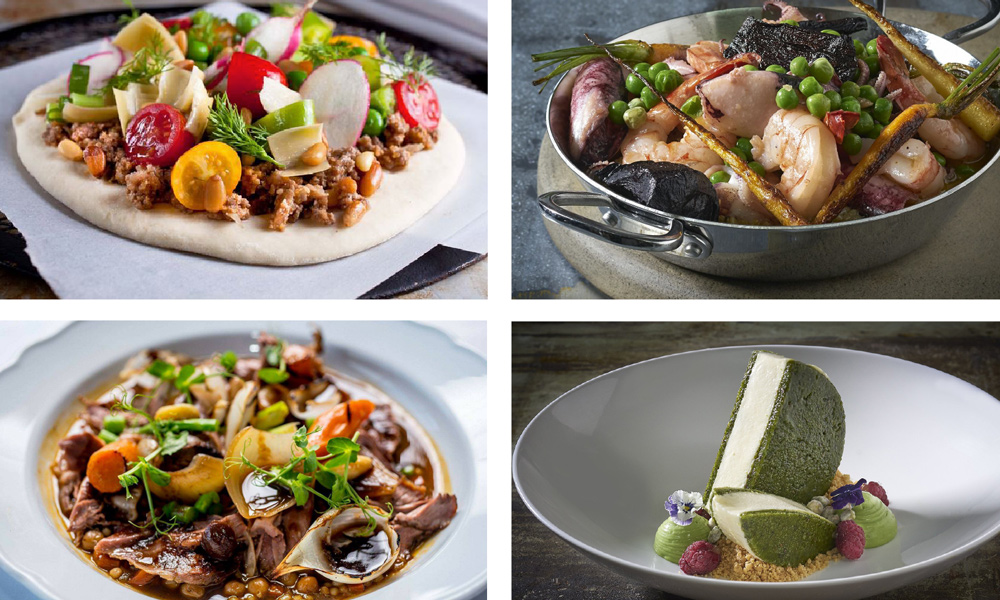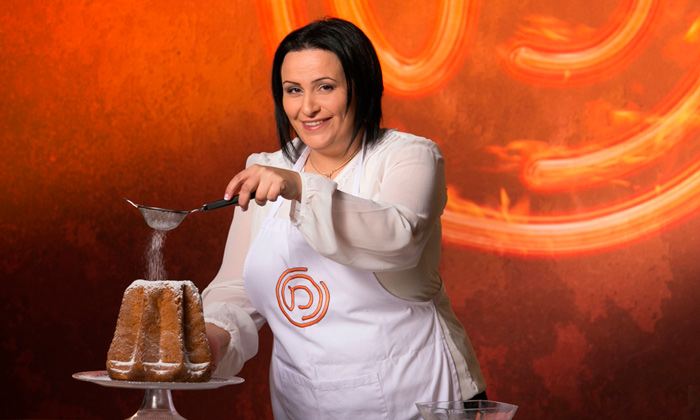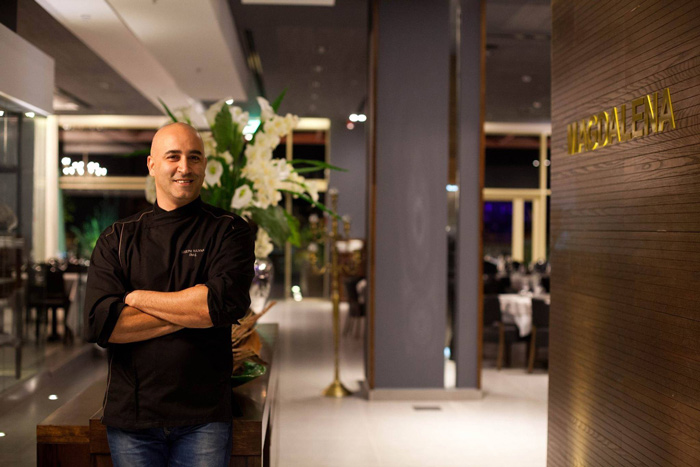Palestinian Haute Cuisine Heats Up

To find Magdalena, first head toward the back of a nondescript shopping mall near Tiberias, on a slow road along the Sea of Galilee. A sleek, paneled elevator will take you two floors up to one of Israel’s most well-regarded restaurants. Named after Mary Magdalene, Magdalena is the brainchild of Yousef “Zozo” Hanna, a Christian Palestinian who grew up in the nearby village of Rama. On any given night Hanna can be found smoothing out a wrinkle on one of the precisely starched linen tablecloths, rearranging an imperfectly plated dish or talking to customers who made reservations well in advance for a seat at the restaurant with stunning views of the Sea of Galilee to the East and the Arbel mountain to the West.
“In Magdalena, I cook my life, my village, my home, my heritage,” says Hanna. For him, this translates into a menu offering dishes such as shish barak, a classic home-style Palestinian dish of dumplings stuffed with lamb and pine nuts, cooked in goat’s milk yogurt, accompanied by a salad of wild chicory with garlic confit and caramelized onions.
Hanna is one of a new generation of Israeli-born Palestinian chefs who are using their talents to express their identity as Arabs and Palestinians while creating fine dining experiences for all Israelis. While this decade has seen the rise of the international superstar Israeli chef—think cookbook writing phenomenon Yotam Ottolenghi or James Beard Award-winning Michael Solomonov—only in the past few years have Israeli Palestinians joined the roster, despite the fact that Arabs make up 20 percent of Israel’s population.
It is difficult to pinpoint and define Palestinian cuisine. “We refer to this area as a-Shams—the Levant—which stretches from Lebanon through Jordan and Palestine,” says Moyin Halabi, chef and owner of the successful Rula in Haifa. “There are, of course, local variations—for example, areas closer to the sea emphasize fish and seafood more than inland areas.” Referring to the 1916 Sykes-Picot agreement between Great Britain and France which carved up Arab territories in the Middle East, Halabi adds, “They might have divided the region into countries, but food doesn’t observe political boundaries.”
“I call the Arab cuisine that I cook ‘food from the Levant,’” says Nof Atamna-Ismael, one of the few female chefs in this up-and-coming group. “It’s characterized by lots of greens and fresh, seasonal produce, olive oil, with less meat and fat than Western diets.” With a doctorate in microbiology, Atamna-Ismael made cooking her profession only after she won Israel’s Master Chef television program in 2014—the sole Palestinian to have won since the show began in 2010.
“To this day, most Israeli Jews think of Arab food as cheap ‘hummus-chips (french fries)-salad-kebab’—all said as a single word. But it isn’t really Arab food at all,” says Hanna. This is in part because in the 1960s and 1970s, Palestinian cooks opened cheap, no-frills restaurants with food designed to appeal to a multiethnic Jewish society: carrot salad with spicy sauce from the Moroccan kitchen, salads with mayonnaise for the Russians, some tabbouleh thrown in to seem authentic. “Believe me, my mother never served me Moroccan carrots or mushrooms in mayonnaise,” says Omar Elwan, who runs the upscale Ale Gefen (Grape Leaf) restaurant in Kiryat Ata, northeast of Haifa. “Sometimes people come into my restaurant and demand that I serve hummus and chips.”


Nof Atamna-Ismael and Yousef “Zozo” Hanna are two of Israel’s top Palestinian chefs.
Instead, Elwan’s gourmet dishes include local favorites such as deep fried kibbeh maklieh (balls made of a finely ground paste of bulgur and seasonings and filled with meat, onions and pinenuts) with an al dente salad of lentils with sprinkles of vegetables; seafood sujuk (a sausage-like slice), and goose breast on the grill with freekeh (toasted green wheat) and mushrooms in beef broth. The signature dish is a creamy lamb neck for two, cooked at a steady temperature sous vide for 72 hours. It represents what Elwan wants to achieve: traditional food with modern technique, “to create something new yet familiar.”
Pointing to the fields turning green in the early spring near his restaurant, Hanna says, “I pick the greens that I serve here, or I buy them in local markets. Olesh (chicory), chubeza (mallow), wild asparagus and mustard greens are in season now, and that is what I will cook. I know that there’s a world trend of cooking from field to table. But I cook like grandmother.”
Today there are a handful of these Palestinian haute cuisine restaurants throughout Israel, and their clientele is primarily Jewish. “Eating out isn’t very developed among Palestinians,” says Elwan. “It just doesn’t seem to make sense to eat their mothers’ cooking” at a restaurant. Relying on a Jewish clientele has its drawbacks, however. According to food critic Ronit Vered, who writes for Israel’s Haaretz, “on the one hand, increasing numbers of Israelis, Jews and Arabs are opening up to new forms of cooking, while also appreciating traditional recipes and especially fresh, local produce. But on the other hand, many Jewish Israelis who observe kashrut won’t eat many of the Palestinian foods.” Indeed, Elwan reports that, despite his restaurant’s success—it’s difficult to get in on the weekends without a reservation—his landlord recently decided not to renew his lease and the restaurant will be closing.
Like everything in Israel, food can get political. “Food is always about culture, identity and conflict,” says Atamna-Ismael. “Food is connection and personal. Whatever I create and give you goes into your body, your blood, your being.” She invests much of her time in finding and preserving local recipes that are in danger of extinction. “We’re at a critical time for preservation. The generation that mastered the preparation of these dishes is disappearing,” she says. “These Arab dishes that are becoming extinct have great historical significance, and preserving them is no less important than preserving historical sites and artifacts.”
Others have a different political concern: what they refer to as Israel’s cultural appropriation. Laila el-Haddad, who wrote the popular cookbook, The Gaza Kitchen: A Palestinian Culinary Journey, warns that, “By appropriating Arab food—and hummus is just one example—Israel has tried to erase the memory and origins of the Palestinians.”
Atamna-Ismael disagrees. “I am proud to share Palestinian recipes, because it affirms my identity, and I am proud when another culture cooks our food. But yes, it does anger me when Jewish Israelis pretend that some of our most beloved recipes are historically Jewish.”
In the end, though, the chef says discussions of who “owns” which food miss the point: “It is the land that owns us, and the land owns the food we eat. So even if the Eskimos came here to live, after a while, they’d be eating hummus, harvesting greens and using olive oil.

